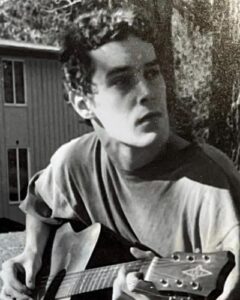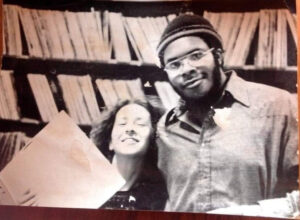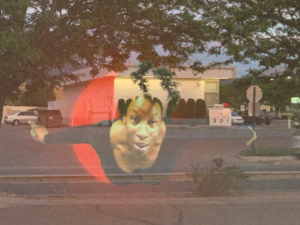By Lucas M. Peters
My polyglot wife is fond of telling me that as you are learning a new language, you are learning a new culture. Language, she says, is an extension of the culture of a place and its people. It is an unwieldy thing that has many strange branches and rules. It simultaneously lives by and defies these rules. Some words from a culture become viral and spread relatively unchanged from culture to culture (“robot” is Czech, “alcohol” is Arabic, “sushi” is Japanese, “guru” is Hindi, to site just a few examples). Most of these viral words denote a specific thing, a noun, from their cultural context. In a way, a single word can give us some sense of the culture. But the entirety of the language itself (a veritable mess of verbs, nouns, adjectives, adverbs, prepositions, pronouns, conjunctions and interjections) is a more complex web that joins people, place, history, and time and all of the other things we think about when we think about a culture. Language is the web that somehow connects these awkward appendages of a culture together.
In our day-to-day lives we depend so much on language, so much on those around us understanding not only the literal meaning of the words we are saying, but also their cultural relevance, their historic value, their contemporary currency, and all of their in-jokes and asides that are inherent in any language.
But what happens when you take this linguistic ability away?
The thing about living in a place where you don’t speak the language of the culture is that it forces you to look for other clues and signs and other means of communication. There is a lot more finger-pointing and gesturing. You smile more. You discover your newfound miming ability. You are forced, without the crutch of language, to find ways to describe what it is that you want or need. And, if you are in one of these places long enough, you can’t help but begin to learn the language.
You begin to pick up on the different rhythms of living, the different cadences of speech, strange inflections, new sounds and different mannerisms. You stare at mouths moving, tongues clicking, rolling and darting, the crease of the lips opening, lengthening up and down, contorting in ways you’ve never seen lips contort before. You stare wide-eyed, mouth embarrassingly agape, trying to understand the world around you and the noises that these people make in the effort to communicate.
You are reduced to being a child.
In your childlike state, you somehow begin to understand a complex truth: as important as language is, it is little more than a gossamer web of words and grammar, letters and punctuation. It is a tool — albeit a beautiful tool when wielded by a particularly great orator or writer — but a tool nonetheless that is just one way for us to share with each other, to make demands, to inquire, to share a life, a laugh, a love.
If you spend long enough in one of these places where the language is incomprehensible, you will begin to grow and understand the things hidden, tucked behind and within the web of language. Of course, not only will you begin to notice these different rhythms of living, cadences of speech, strange inflections and new sounds and different mannerisms, but you will find yourself inhabiting them. You will also undoubtedly begin to understand more of the language and begin to use it. You will have another realization that, as you learn a language, you learn a culture, and as you speak that language, you become a part of that culture.
After a surprisingly short amount of time in this place where you didn’t know the language, culture, people or history, you will find yourself adopting it, molding it to you, into your own speech and your daily life.
Maybe you take a trip back home. Maybe you meet with a few of your friends in your old neighborhood with its familiar streets and cafés. The once familiar language twists and turns around the dinner table and there is a quality to it now that eludes you. You hear everything at once. It is too much and it gallops along frantically, carelessly, a train barreling off its tracks, a series of explosions. The rhythm, the cadence — it is all wrong. This place, this home which you’ve missed, is somehow no longer a home. It has become tinged with the strange as well. You realize that you are no longer of this place, this home. You are now both of this place and not of it.
You leave this home again. You return to the place where you have begun adopting the new rhythms and cadences of a culture and language, and though you will never be wholly of this new place — as you are no longer wholly of that home you have left, that place for which you still feel a nostalgia and the occasional tinge of melancholy wring in your heart — you somehow feel more at home here, among strangers in a land whose mysteries are unraveling one at a time.
This, you realize, is the story of an immigrant — a person who no longer exists in one place or the other; a person who is both here and not here, there and not there; a person who exists and yet is somehow nonexistent; visible yet invisible. To be an immigrant is to exist forever between places, between existences, between languages and cultures. The more places and the more cultures you experience, the more languages you adopt, the more you enter into this liminal space.
Language is an extension of culture, yes, but the language also extends inside you, changes you, shapes and sculpts you. Like that, you become part of its web. And yes, its reach is worldwide.
 Lucas M. Peters graduated from the Goddard MFA program in 2014. His forthcoming travel guide, Moon Morocco, will be published by Avalon in Fall 2015. His work has appeared in Creative Nonfiction, Ploughshares, The Newer York, The Pitkin Review (Goddardites contribute!), Toska Magazine and various other websites, magazines and fora. He recently served as a consultant for The Travel Channel. He lives with his wife in Paris.
Lucas M. Peters graduated from the Goddard MFA program in 2014. His forthcoming travel guide, Moon Morocco, will be published by Avalon in Fall 2015. His work has appeared in Creative Nonfiction, Ploughshares, The Newer York, The Pitkin Review (Goddardites contribute!), Toska Magazine and various other websites, magazines and fora. He recently served as a consultant for The Travel Channel. He lives with his wife in Paris.
You can find him at a café in the 15th or online at www.lucasmpeters.com, Facebook: lucasmpeterswriter, Twitter: @lucasmpeters and Instagram: lucas_m_peters







